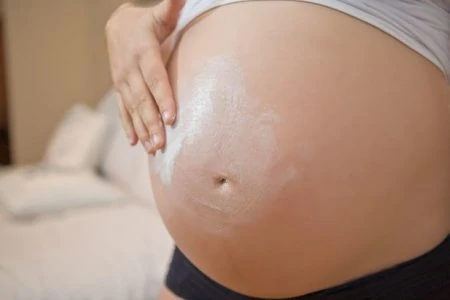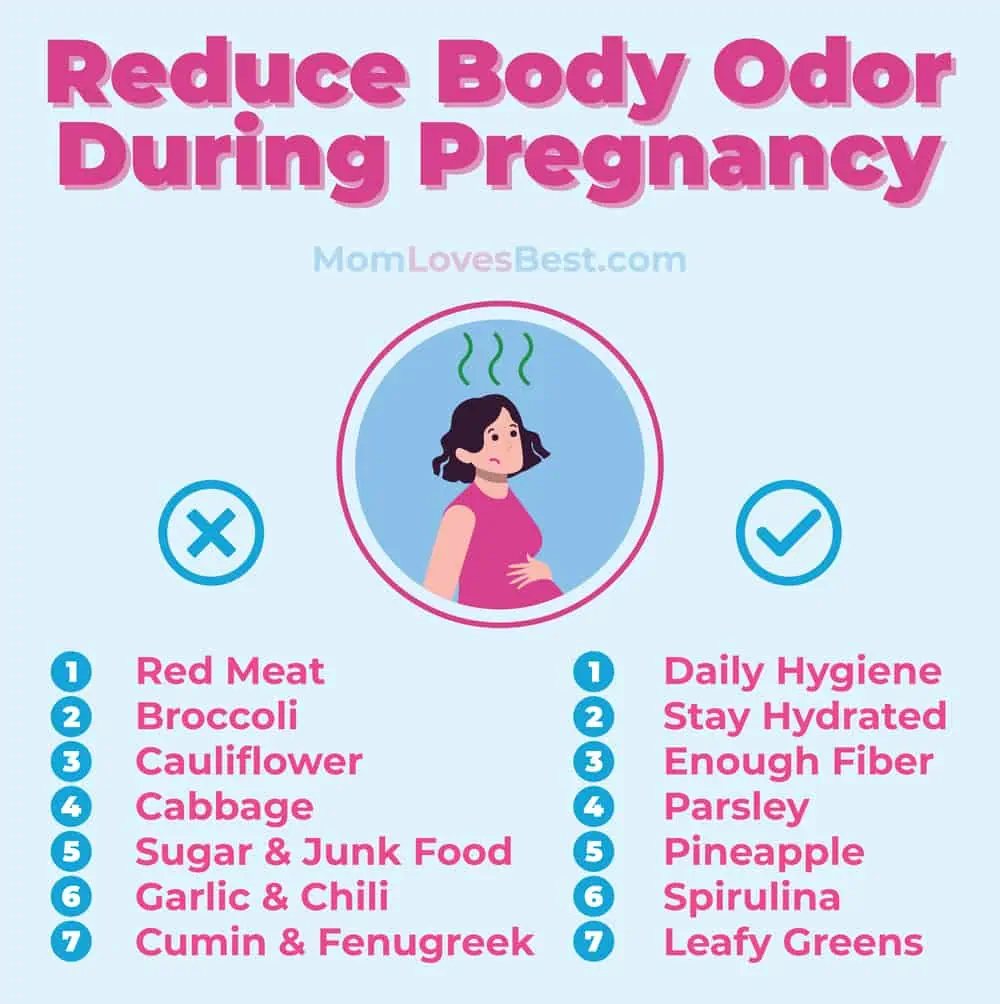What is that smell? If you are pregnant, there is a good chance it is you. Experienced moms know there is a fine line between that rosy pregnancy glow and feeling like a sweaty mess. Thankfully, it is all completely normal.
The massive changes happening in your body mean a little extra odor is unavoidable. There is no need for embarrassment, though; feeling fresh and confident just takes a bit more care than usual.
In this article, we will discuss the causes of pregnancy body odor, why your nose is extra sensitive right now, and what you can do to freshen up.
Key Takeaways
- Hormonal surges (especially estradiol) and increased blood supply rev up your sweat glands and alter your scent.
- You can manage odor by wearing breathable fabrics, staying hydrated, and using natural or pH-balanced hygiene products.
- Diet plays a huge role; red meat and sulfur-rich veggies can increase odor, while fruits and leafy greens help neutralize it.
- Rest assured, these changes are temporary and will likely resolve shortly after your baby arrives.
Why Is My B.O. So Bad?
While some women experience only mild changes after conceiving, others deal with stronger pregnancy symptoms. This is particularly common in the first and third trimesters.
Here are the primary biological reasons you might smell different:
- Hormonal shifts: Surging levels of estradiol and progesterone can boost scent production in your armpits and genitals.
- Increased blood flow: Your body pumps more blood to support the baby, which naturally warms you up.
- Higher metabolic rate: You are burning more energy, leading to a higher internal temperature.
- Overactive sweat glands: Your body sweats more to regulate that extra heat.
- New crevices: Weight gain creates skin folds where bacteria love to hide and multiply.
- Fluid retention: Extra water weight can trap toxins that eventually exit through sweat (1).
All of this means your body odor may become stronger or change its profile entirely. I remember an embarrassing moment in my final month of pregnancy. I was convinced our milk had gone sour and was about to throw it out when my husband timidly told me the milk was fine; that sour smell was actually me.
Ah, the joys of creating a new life!
Dealing With Sweat During Pregnancy
A common complaint is a massive increase in sweat or suddenly finding your own smell offensive. This is normal. Your body is working overtime to grow a human, so cut yourself some slack.
There is a theory that we smell different during pregnancy to help our newborns find us. This unique biological marker may evolve to encourage infants to turn toward the breast during breastfeeding. If you are still experiencing strong body odor during the postpartum phase, this biological instinct might be why.
You might find yourself needing two or even three showers a day. Try keeping the water lukewarm rather than hot. Use a gentle antibacterial soap and dry yourself thoroughly with a clean towel. It adds to your laundry pile, but it is a small price to pay for the confidence boost.
If dampness is an issue, sprinkle cornstarch or talcum powder in key areas to keep dry and prevent chafing. However, keep talcum powder away from your genitals; the jury is still out on whether it is linked to ovarian cancer (2).
Wear loose, natural fibers like cotton, linen, or bamboo whenever possible. These fabrics allow your skin to breathe and do not trap smells like polyester does. If your clothes smell funky even after washing, add a cup of white vinegar to your laundry load to kill odor-causing bacteria.
Beyond general sweat, you might notice specific areas smelling stronger than others. Let’s look at those areas and how to handle them.
1. Vaginal Odor
Stress, sweat, hormonal fluctuations, and pH imbalance can all contribute to a musky scent you are not used to.
Unless you are also experiencing a rash, itching, pain, or “fishy” discharge (which could signal an infection like Bacterial Vaginosis), a stronger vaginal odor is usually harmless. If you feel self-conscious, keeping the bikini area trimmed can reduce surface area for bacteria. Regular rinsing with water and changing unscented panty liners frequently helps, too.
Avoid douching or using strong, fragranced sprays. These products disrupt your natural flora and invariably make things worse. Instead, use mild baby wipes or just plain water.
If you enjoy DIY solutions, there are plenty of recipes for safe, all-natural deodorants you can make at home.
2. Bad Breath
If you have experienced morning sickness, you know that extra brushing, flossing, and mouthwash are lifesavers. Bad breath can also signal dehydration, hunger, or calcium deficiency (3).
Since gum disease is associated with premature labor, chat with your dentist if bad breath persists despite good hygiene. Keep sugar-free mints handy and drink plenty of water. A sprig of fresh mint or a wedge of lemon in your water bottle works wonders for keeping your mouth fresh.
3. Tummy Trouble
Digestion slows down during pregnancy to absorb more nutrients for the baby. Unfortunately, this often leads to constipation, bloating, and gas. Because of hormonal relaxin, you have less control over holding it in, and the smell can be surprisingly potent (4).
If your gas is clearing the room, try wearing maternity underwear with breathable cotton panels. Eating smaller, more frequent meals can reduce that heavy, bloated feeling.
You might also develop “sulfur burps” or indigestion. Over-the-counter heartburn remedies usually help, but always ask your doctor before taking activated charcoal or new supplements.
Some Easy Fixes
4. Musty Hair
Your locks may look lustrous thanks to pregnancy hormones, but some women find their hair smells different even after washing. This happens because hormonal skin changes and scalp oil production can trap odors.
Wash your hair more frequently and ensure you dry it completely; going to bed with damp hair encourages fungal growth and musty smells. Neutrogena T/Gel is excellent for regulating scalp pH. You can also add a drop of tea tree oil to your regular shampoo for a fresh kick.
Can Body Odor Predict Your Baby’s Gender?
The old wives’ tale claims that if you eat a clove of garlic and smell it on your skin immediately, you are having a boy. If there is no smell, it is a girl.
While it is a fun experiment, there is zero scientific evidence to back this up. Your body odor changes due to hormones and sweat glands, not because of the baby’s gender. Do not go painting the nursery blue just because you smell a little garlic!
What To Eat To Reduce Odor
You really are what you eat. Besides hygiene, your diet is the biggest factor in how you smell. Most women find that drinking significantly more water helps flush out toxins and neutralizes strong scents.
Foods that may increase body odor:
- Red meat: The amino acids can affect sweat smell.
- Cruciferous vegetables: Broccoli, cauliflower, and cabbage are high in sulfur.
- Processed sugar: Feeds bacteria on the skin.
- Pungent spices: Garlic, cumin, and fenugreek can seep through pores.
Foods that naturally deodorize:
- Fresh herbs: Parsley, basil, and mint.
- Citrus: Oranges, lemons, and pineapple.
- Leafy greens: Spinach and kale contain chlorophyll, a natural deodorizer.
- High-fiber fruits: Helps keep digestion moving, reducing gas.
Body Odor During Pregnancy FAQs
Take Heart, It Is Temporary!
It feels like a cruel joke that pregnancy gives you stronger body odor and a superhuman sense of smell to notice it. The good news is that you are likely the only one who notices.
Even on days when you feel less than fresh, remember that this is a sign your body is doing exactly what it needs to do. These changes are temporary and healthy. Grab that extra shower, put on some comfy cotton pajamas, and be kind to yourself. You are doing a great job.













